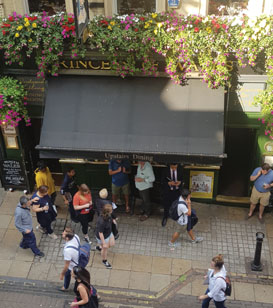Part three of our talk with Phillipe Chiarella, Programme Manager of the Safer Sounds Partnership, a night-time arm of the London-based Safer Business Network, a business crime reduction partnership (BCRP).
It’s looking to develop and deliver what training the sector wants; and is already giving vulnerability training to a pub and club operator. Other training can be about procedures on entry, for those actually searching handbags and the managers (because it’s no good security thinking they should do one thing and management imaging Security is doing another). How to search people, to prohibit drugs and weapons. What to do in case of an acid attack? How to write an incident report? How to bag evidence for the police? To return to those fake IDs carried by Phillipe to brief venues on what they may face, Safer Sounds can offer 30-minute sessions for security and general staff, typically before they start their shift, such as about checking ID (because fake IDs, typically costing £85 or so, are carried to get under-18s into a venue and able to buy a drink). The SIA door training does cover ID, but new sorts of fakes, especially claiming to be from overseas, turn up all the time. And a doorman can see hundreds in a night.
Other training, in sessions of half to three hours, can be how to report suspicious behaviour, or the ‘Ask for Angela’ campaign. Briefly, that’s an aid to the vulnerable; if someone’s gone on a date with someone they met online and finds them creepy (such is the modern world), a way for someone to escape is to go to the bar and ask staff for ‘Angela’. It’s a signal that someone wants help, whether a back door exit or a taxi. Even if a venue has its own way of serving someone who asks for Angela, or may want to put up posters in the toilets, door security staff can be transient so that staff training needs to be refreshed, rather than passed on (in a garbled way) by those on the job longer.
While you only have to go around any British city to see (and hear) how they’ve become busy for much of the night, London arguably has become the most 24-hour of all. It’s been true for ages, that the central and most famous parts are as busy by night as at midday; all-night buses and Tube services are only reflecting that. At 6.30am you are as likely to see on the Tube a security officer knocking off duty, from a shift in a corporate reception, as a steward reporting for duty at a railway station. There lies another truth about the night-time economy; it’s not only about entertainment, but work, and it drives tourism and the wider economy. Hence the Mayor of London Sadiq Khan’s appointment of Amy Lame as ‘night czar’ in 2016, appreciating that the night-time economy is both important and fragile.
You can email Phillipe at [email protected].
For more about ’24 hour London’, visit https://www.london.gov.uk/what-we-do/arts-and-culture/24-hour-london.
Picture by Mark Rowe; pub between Charing Cross and Embankment, central London.









